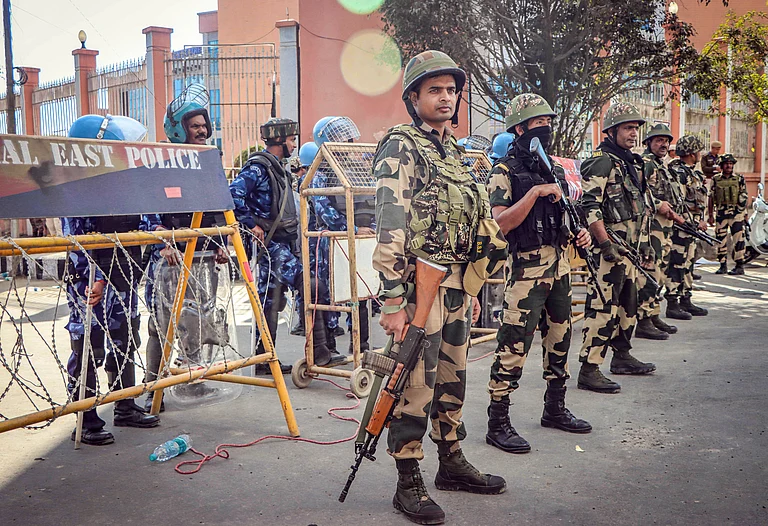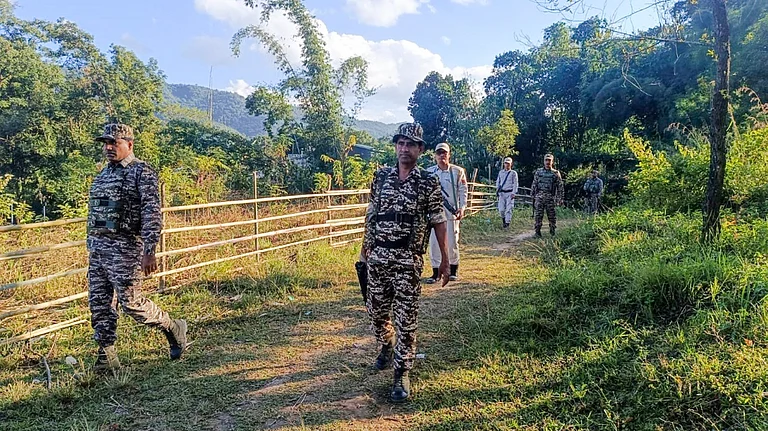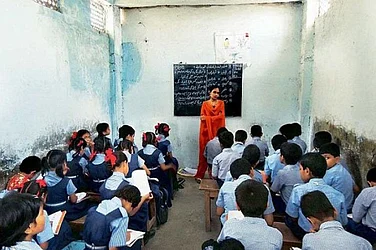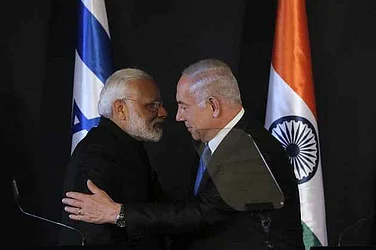Days after the release of the controversial “Biren Tapes” implicating Manipur Chief Minister N Biren Singh in the ethnic clashes in the hill state, a fresh round of violence in Kangpokpi district has left two locals dead and several injured. The clashes were triggered on September 1 when a group of armed militants allegedly used drones to drop bombs on the Meitei-majority Koutruk village, located on the foothills in Imphal West district.
Two villagers including a woman, 33-year-old Surbala Devi from Phayeng Umang Leikai village, were killed in the ensuing gunfight while Devi’s minor daughter was among the nine people injured. Attacks from suspected militants took place again on Tuesday, three kilometres from Koutruk, injuring locals including a 23-year-old woman. The violence once again highlights the precarious position of women across communities who have become unwitting victims of ethnic conflict and militancy in Manipur, which plunged into chaos last year after clashes between the valley-dwelling Meiteis and the tribal Kuki-Zo communities erupted on May 2.
While the Meiteis have blamed Kuki-Zo militants for the attack, the latter claim it is a ploy by the Biren Singh government to foment unrest in the region.
The Manipur Police, which has previously been accused by the tribals of supporting the Meiteis, stated on X (formerly Twitter) that the “unprecedented attack” was carried out by “alleged Kuki militants” who “deployed numerous RPGs using high-tech drones”. “While drone bombs have commonly been used in general warfares, this recent deployment of drones to deploy explosives against security forces and the civilians marks a significant escalation,” the police tweeted. The police also said that the “involvement of highly trained professionals, possibly with technical expertise and support, cannot be ruled out. Authorities are closely monitoring the situation, and the police are prepared to respond to any contingency that may arise”.
Koutruk Village Gram Panchayat chairman confirmed to media outlets that a group of armed men initiated unprovoked firing around 2 pm on Sunday. Most residents of the village had been displaced in the ethnic clashes last year and had recently returned, only to be displaced again by the fresh flare-up. Meitei environmental activist Licypriya Kangujam took to social media to demand action against those behind the attacks: “Today a young mother was killed in front of her minor daughter by dropping drone bombs by Kukis in Imphal West and injuring many others. What action will you take against them?”
Ploy To Divert Attention?
Kuki-Zo civil society bodies have denied the involvement of Kukis in the attack and claimed the violence was a response to the unrest following the release of the controversial “Biren Tapes”, highlighting CM Biren Singh’s role in the violence.
In a statement condemning the violence, apex civil society body Kuki Inpi called the violence a “calculated attempt to ambush Kuki-Zo civilians along the Kanggui-Lamka road”, an essential route connecting Kuki-dominated Churachandpur to other parts of Manipur. Kuki Inpi’s press secretary Janghaolun Haokip alleged that an “ambush” of Kuki-Zo villagers and volunteer village guards led to a gunfight between armed militants belonging to Meitei-led “Arambai Tenggol, Valley-Based Insurgent Groups (VBIGs), Meitei state forces” and Kuki-Zo villagers in Kangchup district.
Committee on Tribal Unity’s (CoTU) Sadar Hills general secretary Lamminlun Singsit said that the violence reflected once again the state’s involvement in systematic attacks against the Kuki-Zo minority. “Since last year, the Manipuri state government and security forces have repeatedly helped Meitei militants carry out attacks on Kuki-Zo villages. Even this time, they tried to compromise the security of the Kuki-Zo people and later blamed the Kukis for the violence,” Singsit said.
Kangpokpi Kuki Inpi chairman Thangminglen Kipgen also noted that the attacks came just a day after massive, peaceful rallies held by the Kuki-Zo community in Manipur as well as in the national capital of Delhi in response to the recently-released audio recordings.
Over 221 people have lost their lives in the ethnic clashes which erupted last year with the hill-dwelling Kuki-Zo communities facing disproportionate violence at the hands of Meiteis, who dominate the valley as well as the state’s politics. Audio tapes submitted by news platform The Wire to the Union-government instituted Commission of Inquiry for Manipur Violence, which were recently put out in the public domain, seem to indicate that Biren Singh and his administration is directly involved and culpable in the conflict, which has now stretched on for over a year and half.
What’s happening in Manipur now?
The conflict has left Manipur divided on ethnic lines with militarised buffer zones dividing the Meitei-dominated Imphal region and its foothills from Kuki-Zo-dominated hill regions like Churachandpur. There are no buffer zones separating Kangpokpi, another Kuki-Zo majority region, from the valley due to the mixed population of Nagas and migrant communities dwelling there. The region, however, remains tense and heavily guarded by village volunteers and members of tribal organisations like CoTU and Kuki Student Organisation (KSO) among others.
The Meitei-dominated Manipur assembly has been in session for the past year under unprecedented circumstances, with 10 of its Kuki-Zo legislators being unable to attend sessions in person in Imphal. No Kuki-Zo people are left in Imphal or its vicinity while Meiteis have been displaced from tribal regions. While the violence across the state has subsided since last year, border villages remain volatile with several incidents of gunfights being reported from these regions in the last few months. Divided ethnically and geographically, the Kuki-Zo groups have demanded a separate administration for the hill districts. “Reconciliation is not possible. We cannot access any government or private offices, institutions or even hospitals in Imphal. Even police officers of the Kuki-Zo community cannot visit Imphal without endangering their life,” Kuki Inpi Manipur president Ajang Khongsai said in Churachandpur.
The Kuki-Zo communities have also been protesting for over a month against the state and Union government’s decision to withdraw Assam Rifles (SAR) troops from tribal-majority districts like Churachandpur, Kangpokpi and Tenguopal, where they have been stationed since the conflict, and replace them with the Central Reserve Police Force (CRPF). Gracy Haokip, a student leader from Churachandpur said that removing the Assam Rifles would leave the Kuki-Zo residents of the region in “grave danger”. “We have no faith in Manipur police or commandos who only serve the Meiteis. Last year, we saw how the Manipur commandoes and state forces helped Meitei militants in their attacks on Kuki villages and torching of their homes,” Gracy said.
Meanwhile, investigations in cases of violence, including gender-based and sexual violence, have not progressed much. Despite the Central Bureau of Investigations (CBI) taking over the probe in a clutch of these cases, not one has reached the trial stage yet.
In the valley, voices seeking removal of Biren Singh as the CM of Manipur have grown in the past year, with even Meitei MLAs as well as Imphal residents seeking his resignation. “Manipur is a failed state. The state and union government could have controlled the violence at its outset if it wanted to, but that was not done,” a senior journalist based in Imphal stated on condition of anonymity. Calling the ethnic clashes “unfortunate,” the scribe said that while the clashes impacted both the Meitei and the Kuki-Zo communities, the latter faced a disproportionate level of violence. “They lost more people to the violence, more Kuki-Zo people were displaced and even the sexual violence cases were more among them. There was a need to reassure the community of their safety which was not done,” the scribe said.
Over 60,000 people have been displaced from both Meitei and Kuki-Zo communities in the clashes, many of whom remain in relief camps in both valley and hill areas. Moreover, the growing power of groups like Arambai Tenggol has also led to anger among Meiteis and fear of persecution, resulting in silence which adds to the group’s impunity. In February this year, the group was accused of abducting Additional Superintendent of Police Amit Kumar, posted in the operations wing of the Manipur Police, from his residence after he arrested some members of the group in connection with a case of vehicle theft. The officer was later rescued.
“They (Arambai Tenggol) are supported by the CM,” a local Meitei shopkeeper in Imphal East stated. “They patrol the streets with arms at night and have even started collecting funds and donations from locals in the name of fighting Kuki insurgents,” the grocery store owner said. Heap, a Meitei Pangal Muslim driver who has been ferrying passengers and media persons between Kuki-Zo and Meitei regions since last year, said that Kuki village guards have also been extracting heavy tolls from drivers in exchange for safe passage.
Heap also added that due to the geographic demarcations, the landlocked valley area of Imphal has been facing a shortage of goods and resources including petrol, which has led to prices skyrocketing. “There is no petrol in any of the gas stations in the valley and most of the stations outside Imphal have been damaged in the clashes. No matter what the situation, it is the common people from all communities that are affected most,” he said.



























